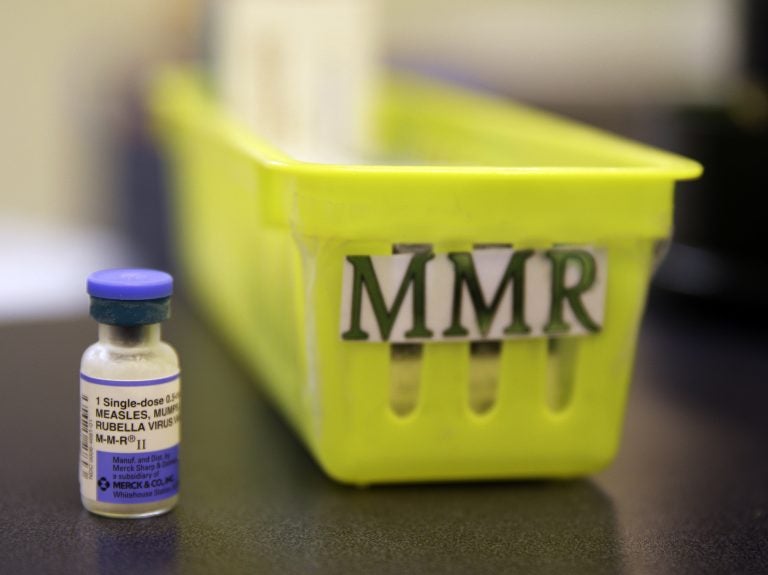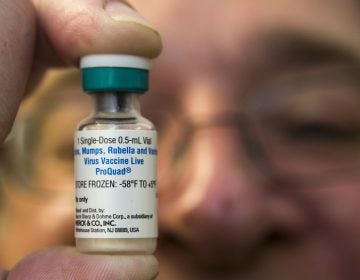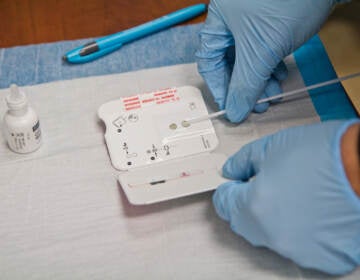Measles cases are rising in the Philly region. Here’s what you need to know
Measles is a highly contagious viral disease that spreads through the air. Experts say vaccination is the greatest tool in preventing an outbreak’s spread.
Listen 1:14
MMR — the modern combination vaccine against measles, mumps and rubella — provides stronger, longer-lasting protection against measles than the stand-alone measles vaccine typically given in the U.S. in the early 1960s. (Eric Risberg/AP Photo)
From Philly and the Pa. suburbs to South Jersey and Delaware, what would you like WHYY News to cover? Let us know!
A string of measles cases in the Delaware Valley has local pediatricians and public health experts on high alert.
An outbreak in Philadelphia dating back to mid-December grew to nine cases this week, and a so-far unrelated single case of measles was confirmed in Camden County, New Jersey, this month.
The spread of the highly contagious, airborne virus is the most dangerous for people who are unvaccinated, immunocompromised, young infants and seniors.
Health experts say people who’ve received the measles, mumps and rubella (MMR) vaccine at some point in their lives can feel confident that they are protected against infection.
But providers say it’s good for everyone to be aware and cautious, and people who are not immunized against the virus can take steps to protect themselves and others if they become ill.
Measles basics: Symptoms, severe illness and treatment
The measles virus primarily spreads from person to person through respiratory droplets in the air.
Early symptoms can appear between seven and 14 days after an exposure and often include a high fever, cough, runny nose, and watery eyes or pinkeye.
What follows is a red rash. Dr. Anat Feingold, division head of pediatric infectious disease at Cooper University Health Care in Camden, New Jersey, said red spots typically appear first on the head near the hairline and neck before spreading down to other areas of the body.
Fevers can reach high temperatures of 103 and 104 degrees and the rash can last a couple days before it begins to fade.
There is no specific treatment for measles, no antiviral medications. Providers may recommend over-the-counter fever reducers and vitamin A to ease symptoms at home.
“Most of the time this is supportive care and just watching to make sure the symptoms don’t progress to something more serious,” said Dr. Salwa Sulieman, pediatric infectious disease expert at Nemours Children’s Health in Wilmington, Delaware.
People may need hospitalization for complications like dehydration and diarrhea, ear infections, pneumonia, and, in severe cases, brain swelling, neurological and respiratory issues.
For every 1,000 children who become ill from the virus, an estimated one or two will die, according to global data.
“I think what happens is, when people don’t see the disease around them, they forget how bad such a disease can be,” Feingold said. “As a mother and a grandmother, I would never want anybody I love to have to experience a measles infection.”
What to do if you or your child have possibly been exposed
The measles virus can linger in the air for up to two hours after someone who is contagious has left a room, according to the Centers for Disease Control and Prevention.
When there is a confirmed case in a community, local health authorities will investigate to identify places where that person may have been contagious and therefore exposed other people to the virus.
In Philadelphia, the city Department of Public Health has listed specific dates and times at five locations where people may have been exposed to measles, another two health facilities in Montgomery County and one hospital in Wilmington, Delaware.
Officials at the Camden County Health Department in New Jersey have identified two sites — a pediatric office and a hospital emergency department — as possible exposure locations for one confirmed case of measles reported last week.
“If you know that you’ve been in a place where there were cases of measles and you develop these symptoms and aren’t vaccinated, you should absolutely stay at home and call your doctor for further instructions,” said Dr. Emily Spengler, a pediatrician at the Center for the Urban Child at St. Christopher’s Hospital for Children in North Philadelphia.
If someone knows they may have been exposed or is experiencing active symptoms of measles, Spengler said it’s important they try to first call ahead to any health clinic or hospital they may visit.
“They need to prepare for this, because there are special negative pressure rooms that they could put your child in so that they can care for your child and they can prevent spreading,” she said. “The last thing we want is for a child to be sitting in an emergency room waiting room and exposing anybody who’s unvaccinated.”
People may be asked to quarantine following an exposure, and Feingold said if they are, people should follow that seriously to ensure others aren’t put at risk, especially vulnerable populations.
It’s a good time for everyone in affected communities to confirm their vaccination status, said Sulieman, but especially people who have been to exposure locations.
“They can check with their primary care physician or in their medical records to make sure that they’ve been fully vaccinated,” she said. “If they haven’t, it would be a really good time to get the measles vaccine.”
Measles (mumps and rubella) vaccination and immunity
Beginning at one year old, most children are given their first dose of the combination measles, mumps and rubella vaccine. The CDC recommends a second dose between the ages of 4 and 6 years.
The vaccine contains a live-attenuated virus, “meaning the virus has been changed so that it induces immunity so you make the right kind of antibodies and immunity to protect against infection, but it doesn’t cause the disease,” Feingold said.
Widespread vaccine campaigns during the last five decades have drastically decreased viral transmission and cases in the United States and globally as herd immunity became stronger. That’s when a high percentage of people in a local community is immunized to collectively protect the few who are not.
But small outbreaks and pockets of infections continue to crop up, mostly among unvaccinated people.
Feingold said she feels distressed at declining rates of childhood vaccinations for diseases like measles and fears the dangers it poses to public health more broadly.
“What happens when you have a critical mass of people who are not vaccinated is you lose that protection of herd immunity,” she said. “Then people who are either immune suppressed or who can’t receive vaccines or are too young to receive vaccines, you put all of those people at risk.”
Decades of research shows that the vaccines are very safe and effective. The most common side effects include soreness at the injection site, fever as the body works to generate antibodies, a mild rash and temporary joint pain or stiffness.
Older children and adults who’ve never been vaccinated before can also become immunized on a catch-up vaccine schedule.
“It’s not too late to be protected,” Sulieman said. “Hopefully as we’re able to get further out into this [outbreak], the cases will become less and less.”
To reach families who may be resistant to vaccination, Spengler said it’s important to understand where their concerns or fears are coming from, “and not just dismissing them as irrational or unreasonable.”
“Then, hopefully we can explain where we’re coming from,” she said, “where vaccines are the best way to keep your child safe, keep your child healthy and keep the community healthy.”

Get daily updates from WHYY News!
WHYY is your source for fact-based, in-depth journalism and information. As a nonprofit organization, we rely on financial support from readers like you. Please give today.





